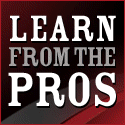A lot of SNG players seem satisfied to come third and at least lock in a small profit for their efforts. It is as though they relax and let their guard down as soon as this moment is reached, and good players can sense this straight away.
Other SNG players react to this stage of the tournament by pushing far too aggressively as though they have been reduced to a binary method of playing poker: all-in or fold, with nothing in-between. These players can catch lucky, and there will be pots that they take down uncontested, but this style does not work in the long run.
When you are three- or two-handed at the end of a Sit 'N Go you need to loosen up your starting hand requirements considerably, and you also need to play your position aggressively, but now is the time for smart tactical play rather than throwing caution to the wind.
You must take into account the size of the blinds when all the remaining players are in the money. If the tournament has dragged through numerous levels and the blinds are extremely high it limits your actions. But, even in cases like this, there are keys to remember that can help you finish first.
Most flops miss most hands
This becomes more prevalent and more relevant when you are heads-up, but it also should be kept in mind when you are three-handed. That is why aggressive play is so vital at this late stage. If you are first to bet into a pot where the flop has missed everyone you are going to stay ahead of the rising blinds, and put your opponents under tremendous pressure. You must actively try to steal pots late in the tournament. The easiest way to do this is when you are on the button, or if you are the small blind and the button has already folded. If you are heads-up you need to vary your betting but for the most part you need to force your opponent to make uncomfortable decisions. What does that mean? You need to raise from the small blind, or if you're in the big blind and your opponent limps in you need to bump it up. Now, bear in mind that players love to trap heads-up, and that you cannot always predictably raise pre-flop, but that being said it is imperative to give as few free rides as possible.
Push your big face cards
Q7 is a decent starting hand when you are short-handed. Anything higher than this is playable, including Kx, Ax, and obviously any small pairs. The latter are powerful here, but only pre-flop. Don't slow play them hoping to hit a set. There's no value in this play now. Instead push hard with them pre-flop. Low suited connectors are very vulnerable, especially heads-up. They don't play well against one opponent, and if that opponent is making you pay everything to hit a draw it will cost you money long-term to nurse these hands to the river. You ideally want a "big" face card in this situation. You will be surprised how often high-card holds up, and if you make top pair with Q or better that is also strong right now. I see a lot of players overvaluing hands like JT that are good full-table hands, but which start off trailing a hand like K2 that you would always muck at a full table. Your mind must adjust to the fact that the endgame is often a series of races, and all you can hope to do is start those races in front.
Ax is good more than 50 percent of the time
Ax is a tough hand to play in any tournament at any stage of the tournament. In SNG's you need to treat these hands with caution until you are short-handed. Early on you can play them if they're suited, and they can stand a raise or two then as well because of the implied pot odds if you hit a flush, but in the middle stages you must adopt a conservative stance towards Ax. Now that you're in the money you have to presume that your A is good more than 50% of the time, unless there is strong betting evidence to the contrary. As with all discussions of poker strategy playing these hands depends on the specific tournament, but if you face an aggressive player late in the day and you hold Ax it is probably wrong to back down. Remember that aggressive players are going to push at you with any paint in their hand and you cannot afford to lay down a hand like Ax against that type of opponent.
Never fold when you are heads-up and first to act!
This is a crucial piece of advice that I stand by in every tournament. Even if you hold complete garbage like 37 and you're in the small blind you need to call the big blind, or possibly raise him 2x the size of that big blind. You must limp in and make him raise you out of the hand. Why? Well, you assume your hand is worst, but you have no idea if this is true, or will be true after the flop. If you call and he holds a hand like 47 he is in front but will gladly take the flop for free. Now the flop might bring a 3 or (far more likely) it will bring nothing for either of you. He will check his garbage and give you an opportunity to steal a pot you would never have played for in the first place. Make your opponent decide if he wants to win the hand pre-flop. From a mathematical perspective, as well as a game theory angle, folding when you are first to act heads-up just does not make sense.
Be aware of the situation
If you are in a three-way tussle for the cash and your two opponents are both fiery and active let them knock each other out. If they're both timid start pushing them around with any two cards. If you and an opponent have 90% of the chips gang up on the poor soul who has 10% left. Avoid playing hands against one another and blast the third guy off the table. Playing your opponents now becomes far more important than playing your own cards. Let me end with a pertinent example:
You have 5000 chips. Opponent A and Opponent B are even with 2500 chips each. You are in the big blind and pick up JJ, a huge hand at this stage. Opponent A who is super-aggressive goes all-in. Opponent B who is super-tight calls all-in. Now think about this for a second. You know that Opponent B wouldn't call in this spot without a big hand, at least Ax. You have the opportunity to end it all, but at best you'd be 40% to beat both of them (we can't be sure what Opponent A has, and cannot discount the fact that he was lucky enough to pick up something good) - your hand selection here is influenced by the circumstances, and the correct play is to fold. You move up from 20% of the stakes money to a 50/50 opportunity playing for the remaining 80% of the prize money (the Opponent who wins will have the same number of chips as you).
There is an old saying in poker that you need to get all your chips in the middle when you have the best hand, but that was before the age of the Sit 'N Go. In this case you should fold. You might even go so far as to fold KK in this spot and only play pocket Aces. Could you do this? Would it be the smart play? There are very few "right" answers in poker that hold true in every situation, and SNG tournaments are endlessly fascinating for this very reason. They are always tossing you new and tricky problems to solve in seconds, and you won't get it right every time. But if you follow these fluid suggestions for hand selection you will have an edge, and over time that edge will translate into profits.
Basic strategy for Sit and Go Tournaments
Hand Selection In SNG Tournaments ? Part 1, Early Play
Hand Selection In SNG Tournaments ? Part 2, Middle Play
Hand Selection In SNG Tournaments ? Part 3, In the Money


